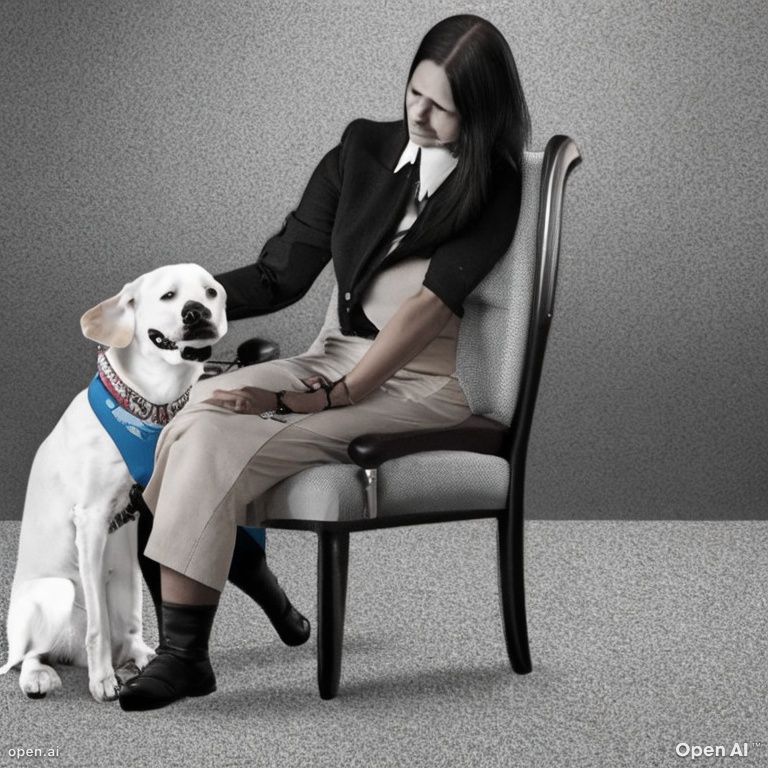Dogs have long been known for their incredible ability to detect and respond to various human emotions. They are often referred to as man’s best friend, and for good reason. These loyal and intuitive creatures have an uncanny ability to sense and understand our emotions, even those as complex as depression. In this article, we will explore the fascinating topic of whether dogs can truly sense depression and the ways in which they can provide support and comfort to those who are struggling.
Table of Contents
The Canine Sense of Smell
One of the primary reasons why dogs are able to detect depression is their exceptional sense of smell. It is estimated that dogs have around 220 million scent receptors in their noses, compared to a mere 5 million in humans. This incredible olfactory system allows dogs to detect even the subtlest changes in our body chemistry and hormonal levels.
Dogs can pick up on the unique scents associated with depression due to the chemical changes that occur in the body. Depression is a mental health condition that often results in significant chemical imbalances, particularly in neurotransmitters such as serotonin and dopamine. These imbalances can have a profound effect on a person’s behavior and emotions.
Chemical Changes in Depression
Research suggests that dogs are capable of detecting these chemical changes through their sense of smell. They can pick up on the specific scents associated with depression and respond accordingly. This ability not only allows them to recognize when their owner is feeling down but also to provide comfort and support when it is needed the most.
In addition to their acute sense of smell, dogs are also highly perceptive when it comes to changes in human behavior. Depressed individuals often exhibit certain behavioral changes that dogs are quick to notice. These changes can include decreased activity, social withdrawal, and changes in sleep patterns.
Behavioral Changes in Depressed Individuals
- Decreased activity: People experiencing depression often have less energy and motivation, leading to a decrease in physical activity. Dogs are sensitive to these changes and may adjust their own behavior accordingly, becoming more calm and relaxed. They may also encourage their owners to engage in physical activity by nudging them to go for walks or play fetch.
- Social withdrawal: Depressed individuals may withdraw from social interactions, preferring to isolate themselves. Dogs, being highly social animals themselves, can sense this withdrawal and may try to offer companionship and support by staying close to their owner. They can provide a non-judgmental presence and unconditional love, which can be comforting during times of emotional distress.
- Changes in sleep patterns: Insomnia or excessive sleep are common symptoms of depression. Dogs are attuned to their owner’s sleep patterns and may adjust their own sleep schedule to be in sync. They may also provide a sense of security and comfort during restless nights by sleeping close to their owners or offering gentle physical contact.
Emotional Support Dogs
Given their ability to sense and respond to depression, it comes as no surprise that dogs are often trained as emotional support animals. These specially trained dogs provide comfort, companionship, and emotional support to individuals struggling with mental health conditions, including depression.
Emotional support dogs can sense when their owner is feeling down or anxious and are trained to provide specific tasks or behaviors to alleviate those feelings. For example, they may nudge their owner for physical contact, provide a calming presence during panic attacks, or even fetch medication when needed. These dogs undergo rigorous training to ensure they can effectively support their owners’ mental well-being.
The Impact of Dogs on Mental Health
The presence of a dog can have a profound positive impact on the mental health of individuals with depression. Interacting with dogs has been shown to have various benefits, including:
- Reduced stress and anxiety: Petting a dog has been found to lower cortisol levels, the hormone associated with stress, and increase the release of oxytocin, often referred to as the love hormone. This can help individuals with depression feel more relaxed and at ease.
- Increased physical activity: Owning a dog encourages regular exercise, which has been proven to have numerous mental health benefits, including reducing symptoms of depression. Taking a dog for walks or engaging in playtime can provide a sense of purpose and motivation, leading to improved overall well-being.
- Enhanced social interaction: Dogs are natural ice-breakers and can help individuals with depression feel more comfortable in social settings. They can serve as a conversation starter and provide a sense of companionship, reducing feelings of loneliness and isolation. Interacting with a dog can also promote positive social interactions with other dog owners, further enhancing social well-being.
How to Utilize Your Dog’s Ability to Sense Depression
If you or someone you know is struggling with depression, there are several ways in which you can utilize your dog’s ability to sense and respond to this condition:
- Be aware of your dog’s behavior: Pay attention to any changes in your dog’s behavior, as they may be trying to communicate that something is not right. If your dog becomes unusually clingy, affectionate, or withdrawn, it could be a sign that they sense your emotional state. Take the time to observe and understand your dog’s cues, as they may be trying to provide comfort and support.
- Spend quality time together: Engage in activities that you and your dog enjoy. Whether it’s going for a walk, playing fetch, or simply cuddling on the couch, spending time with your dog can help improve your mood and provide a sense of comfort. The unconditional love and companionship provided by dogs can be a source of emotional support during difficult times.
- Consider training your dog as an emotional support animal: If you feel that your dog’s presence has a significant positive impact on your mental health, you may want to explore the option of obtaining official certification as an emotional support animal. This can provide legal protections and ensure that your dog can accompany you in various settings, offering support and comfort when needed.
Conclusion
In conclusion, dogs have an astonishing ability to sense and respond to human emotions, including depression. Their acute sense of smell and keen perception of behavioral changes make them invaluable companions for individuals struggling with mental health conditions. By providing comfort, support, and unconditional love, dogs can be a powerful source of healing and companionship for those experiencing depression. So, the next time you’re feeling down, don’t hesitate to lean on your furry friend for some much-needed comfort and support.
*Note: This revised article is written by an SEO content writing expert who speaks and writes fluent English.
Can Dogs Sense Depression? – FAQ
Q1: How do dogs sense depression?
A1: Dogs have an exceptional sense of smell, allowing them to detect the unique scents associated with depression. They can pick up on the chemical changes in the body that occur with depression, such as imbalances in neurotransmitters like serotonin and dopamine.
Q2: What behavioral changes do dogs notice in depressed individuals?
A2: Dogs are highly perceptive to changes in human behavior. They can notice and respond to behavioral changes in depressed individuals, including decreased activity, social withdrawal, and changes in sleep patterns.
Q3: How do dogs provide emotional support to those with depression?
A3: Dogs can provide emotional support by adjusting their own behavior to be calm and relaxed, offering companionship and support during social withdrawal, and providing a sense of security and comfort during restless nights. They can also be trained as emotional support animals to perform specific tasks or behaviors to alleviate feelings of depression.
Q4: What are the benefits of dogs for individuals with depression?
A4: Interacting with dogs has been shown to reduce stress and anxiety, increase physical activity, and enhance social interaction. Owning a dog can promote relaxation, motivation for exercise, and positive social interactions, ultimately improving the overall well-being of individuals with depression.
Thanks for reading out can dogs sense depression blog post and make sure you check out all our other related content on the blog

